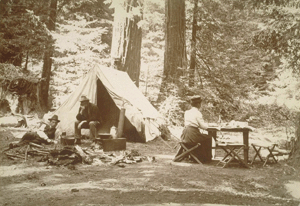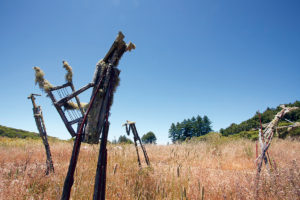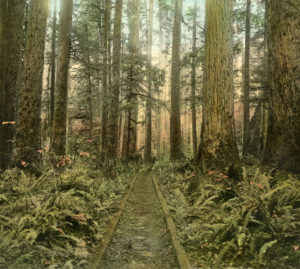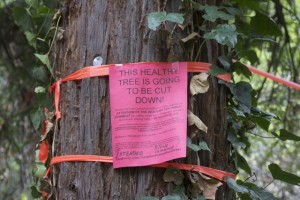Delphin Delmas, a noted defense attorney, was a member of the movement to save the redwoods of the Santa Cruz Mountains. The following selection is an excerpt from his address to the California State Assembly on February 18, 1901, in support of a landmark bill appropriating $250,000 for the purchase of 2,500 acres of redwood forest northeast of Santa Cruz. The bill was passed later that month, leading to the creation of Big Basin, California’s first state park. This year, Big Basin State Park celebrates its centennial with a variety of public events, hikes, exhibits, and activities, both indoor and outdoor, throughout the summer and fall. For more information, contact the Mountain Parks Foundation at (831) 335-3174 or www.mountainparks.org, and the Sempervirens Fund at (650) 968-4509 or www.sempervirens.org.
. . . I appear before you under the favoring auspices of the Sempervirens Club. That association, as you are doubtless aware, is composed of some of the foremost representatives of education, municipal government, and public affairs, and many, too, of the gentlest and most generous ladies of the land. The object which it has in view is fairly indicated by the name it has assumed. Its labors are devoted to the preservation of a fragment, at least, of those redwood forests which, in the infancy of the State, extended in exuberant profusion along our seaboard from the Oregon line to Monterey, but which, invaded now by the demands of commerce, are being so rapidly destroyed that unless the hand of devastation is stayed soon no vestige of them will remain. While the field of activity of these public-spirited citizens is confined to no section of our territory, yet I voice their sentiments when I state that, for the present at least, they have centered their attention upon one particular spot and the preservation of one especial body of trees. And had you visited this spot, as I lately did, had you felt, as I felt, the emotions which it awakens, had you been brought, as I was, under the influence of the spirit of the place, you too must needs share in their enthusiasm and justify their predilection.
- Camping at Big Basin (no date). Photo by Alice Iola Hare, courtesy of Bancroft Library, U.C. Berkeley.
In the heart of the Santa Cruz Range this chosen spot is found. It presents to the eye the aspect of a vast amphitheater whose encircling walls are the dim heights of mist-crowned mountains. Seen from the crest of the ridge, it stretches toward the setting sun, its distant outlines blending the purplish-blue tints of the woods with the hazy vapors of the ocean. From this point of view you catch a confused suggestion of a great forest watered by intersecting streams. Descend from your eminence and enter within the limits of the forest. Your first feeling is one of awe. Your very breath seems hushed by the solemn stillness of the place. Here the winds are mute. Their distant murmurings are unheard within the depths of the shaded solitude. Your step falls noiseless upon the thick carpet of marl—the cast-off vesture of countless seasons—upon which you tread. The crackling of a twig under your foot or the startled cry of a frightened bird but intensifies the silence which enfolds you like a shroud. Contemplate now the scene spread on every hand in never-ending vistas. See the great moss-covered oak, the light and graceful maple, the glossy laurel, everywhere entwining their branches and blending the varied hues of their foliage in tangled profusion, while here and there the glistening trunks of clustered madronos stand out against the dark background like streaks of yellow sunlight. As you lift up your eyes, behold above the giant forms that sentinel the place. These are California’s own—hers, for in no other soil have they ever found root and under no other breeze save that of the Pacific have they ever swayed their boughs.
A sense of humility overwhelms you as you gaze upon these massy pillars of Nature’s temple, whose tops, lost amid the clouds, seem to support the vault of the blue empyrean. The spell which the mystic light of some venerable cathedral may at times have thrown upon your soul is tame compared to that which binds you here. That was man’s place of worship; this is God’s. In the presence of these Titanic offsprings of Nature, standing before you in the hoar austerity of centuries, how dwarfed seems your being, how fleeting your existence! They were here when you were born; and though you allow your thoughts to go back on the wings of imagination to your remotest ancestry, you realize that they were here when your first forefather had his being. All human work which you have seen or conceived of is recent in comparison. Time has not changed them since Columbus first erected an altar upon this continent. . . . They were old when Moses led the children of Israel to the promised land. . . . And if their great mother, Nature, is permitted still to protect them, here they will stand defying time when not a stone of this Capitol is left to mark the spot on which it now stands, and its very existence may have faded into the mists of tradition.
You experience a feeling of profound sadness as you conjure up the picture of these venerable trees falling hacked and shivered, to become the commonplace materials of barter and trade. As you behold their lofty foliage stirred by the ocean breeze, you seem to hear them murmur a prayer to be saved from such desecration. . . .
Legislators of California, guardians of her material interests, but custodians no less of her physical beauty, will you turn a deaf ear to these appeals? Upon what ground would such a course stand justified before your constituents?
Legislators of California, while deeply grateful for the courteous attention you have accorded me, I cannot but apologize for the trespass I have already made upon your time. No one better knows the importance of your labors here and the mass of legislation pressing upon you. Yet, even so, turn not away from this project. The people have it at heart. Attend to it—attend to it, I pray you, now. Do not leave it as unfinished business to your successors. When they shall come upon the scene it will be too late. The slopes which surround this forest are already denuded. The work of devastation has reached the very edge of these woods. There, even while I speak, the axman stands ready to strike. If he pauses, it is only to await your decision. Two years from now his work will be done, and the last remaining fragment of the primeval trees which clothe the mountains rising up at the very threshold of our metropolis will have vanished. Vain, then, will be our regrets, and all attempts to repair the evil vain. Man’s work, if destroyed, man may again replace. God’s work God alone can re-create. Accede, then, to the prayers of the people. Save this forest. Save it now. The present generation approves the act; generations yet unborn, in grateful appreciation of your labors, will rise up to consecrate its consummation.
Research for this article provided by Irene Barnard.

.jpg)




.jpg)